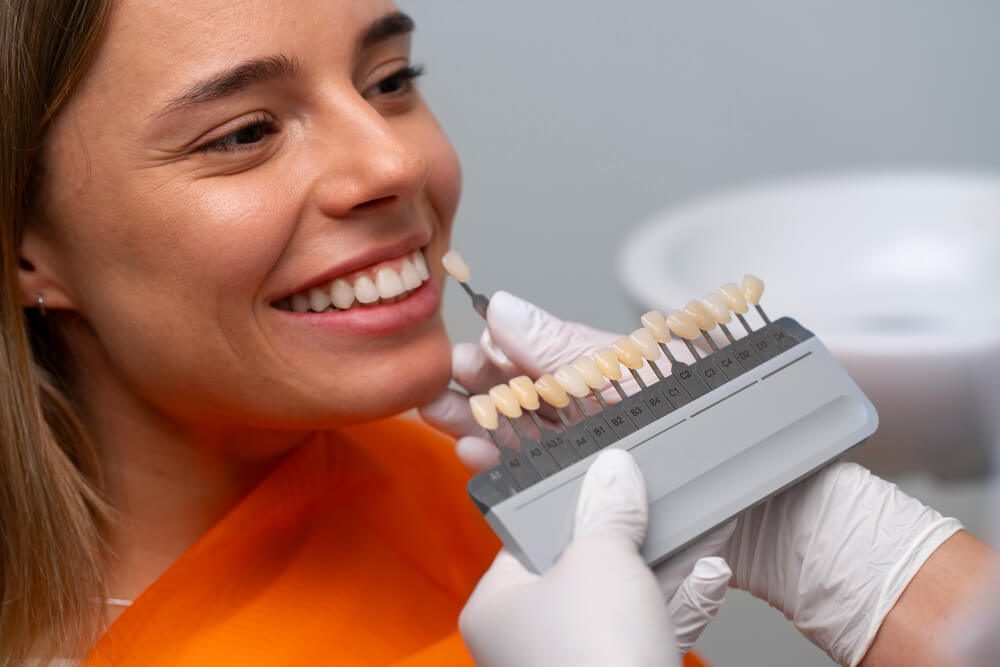How Long Do Veneers Last, and What Affects Their Longevity?

Dental veneers are unparalleled when it comes to changing your smile. Whether you’re covering up discolouration, chips, or minor misalignment, veneers offer a long-lasting solution that enhances appearance and confidence.
If you’re investing in a smile upgrade, understanding how to maximise your veneers is essential.
Understanding the Lifespan of Veneers
Veneers aren’t a one-size-fits-all solution. Each dental veneer material has a different expected lifespan.
There are two primary choices for dental treatment: porcelain veneers and composite veneers.
- Porcelain Veneers are the preferred choice for cosmetic dentistry because they offer excellent durability and realistic aesthetics. They last an average of 10 to 20 years with proper care, and some patients enjoy their porcelain veneers for 25 years or more.
- Composite Veneers: Made from resin, these are more affordable and require less tooth preparation. However, they typically last 5 to 7 years before needing replacement.
While both options offer aesthetic improvements, porcelain veneers have a significantly longer lifespan and superior resistance to staining and wear.
What Affects the Longevity of Your Veneers?
While veneers are strong, they’re not indestructible. Their lifespan depends on several factors, and knowing what impacts their durability can help you maximise their longevity.
1. Oral Hygiene Habits
Good oral care isn’t just about keeping your natural teeth healthy—it significantly affects how long your veneers last. Brushing twice daily with non-abrasive toothpaste and regular flossing helps maintain the integrity of the veneers and the underlying teeth.
The lack of oral hygiene creates gum disease that threatens the secure placement of veneers.
2. Diet and Eating Habits
Certain foods and drinks can affect the lifespan of your veneers. While porcelain veneers resist stains better than composite ones, excessive coffee, red wine, or highly pigmented foods can still dull their shine over time.
Chewing hard foods such as ice, nuts, and candies can cause signs of chipping or cracking in veneers.
3. Teeth Grinding (Bruxism)
Habitual tooth clenching and grinding behaviour shorten the lifespan of your porcelain veneers. Intense grinding pressure on dental veneers creates conditions where cracks form, or the materials wear down prematurely.
If you suffer from bruxism, wearing a custom nightguard while sleeping can significantly extend the lifespan of your veneers.
4. Injury or Trauma
Accidents happen, and a direct hit to your mouth—whether from sports, falls, or other trauma—can cause veneers to break or dislodge. Wearing a protective mouthguard is smart if you engage in contact sports or activities where your mouth is at risk.
5. The Quality of the Dental Work
Not all veneers are created equal, and your dentist’s skill matters. High-quality materials, precise placement, and bonding techniques ensure better fit and longer-lasting results.
Choosing an experienced dentist who carefully plans and applies your veneers significantly affects their durability.
6. Regular Dental Check-Ups
Regular dentist visits with professional cleanups maintain the proper condition of your dental veneers. Your dentist will detect wear signs before making necessary adjustments and recommending prolonged use.

How to Make Your Veneers Last Longer
You’ve invested in your smile—now it’s time to protect it.
Here are some key tips to ensure your veneers go the distance:
- Practice Excellent Oral Hygiene: Brush and floss daily, and use a soft-bristled toothbrush with a non-abrasive toothpaste.
- Be Mindful of Your Diet: Consuming staining foods and drinks and chewing hard items should be minimised.
- Wear a Mouthguard if Needed: Sports enthusiasts and tooth grinders should consider using mouthguards to protect their veneers against damage.
- Don’t Use Your Teeth as Tools: Biting into pens, opening packaging with your teeth, or other bad habits can lead to cracks and chips.
- Visit Your Dentist Regularly. Routine check-ups ensure any issues are caught early, preventing bigger problems later.
When Is It Time to Replace Veneers?
Even with the best care, veneers won’t last forever.
Over time, you may notice signs indicating it’s time for a replacement, such as:
- Chipping or cracking
- Discoloration or staining
- A rough or worn-down surface
- Gum recession revealing the edges of veneers.
- Loosening or detachment
If you experience any of these, schedule a visit with your dentist to assess whether a replacement is necessary.
Dental Veneers in Gordon
Veneers are a fantastic investment in your smile. They offer both beauty and durability. They can last well over a decade—sometimes even two- with proper care.
Good oral hygiene, mindful eating habits, and proper protection from excessive wear allow people to keep their veneers longer while maintaining an attractive smile.
At Northern Dental Gordon, we’re not just about treating teeth; we’re here to make your dental experience comfortable and keep your oral health for years.
If you’re considering veneers or need advice on maintaining the ones you have, book an appointment with us today. Our team is here to help you keep your smile looking its best for the long haul!
Call us at (02) 9498 8290 or visit us at Suite 3, 2 St Johns Ave in Gordon.
